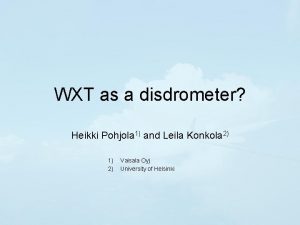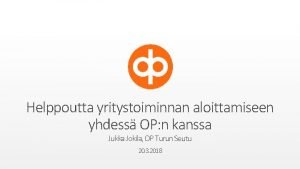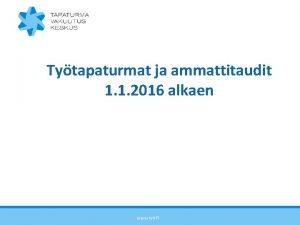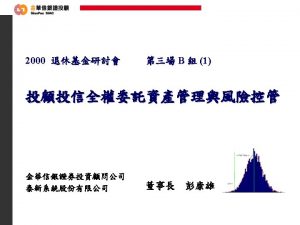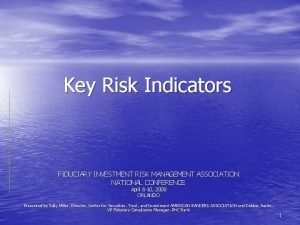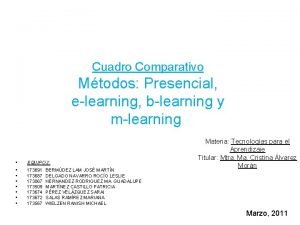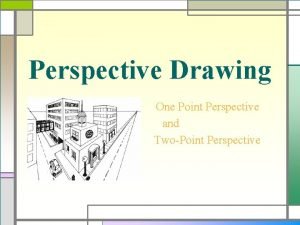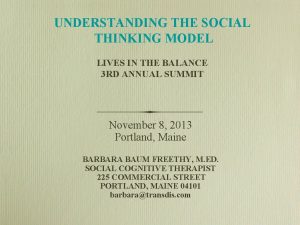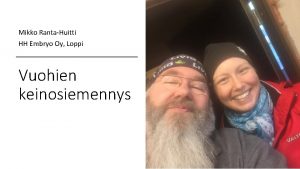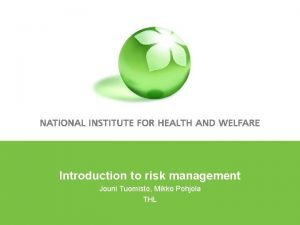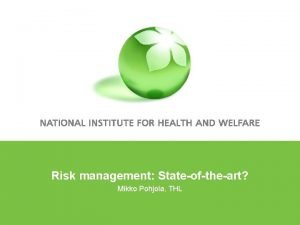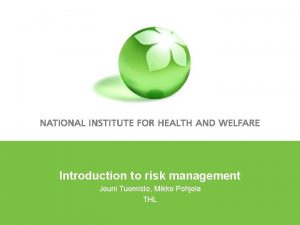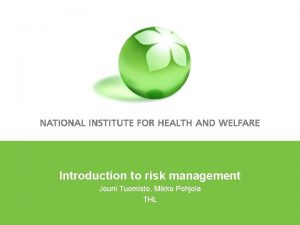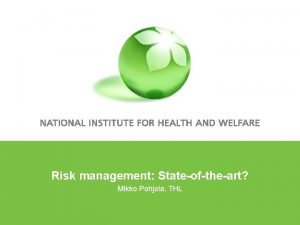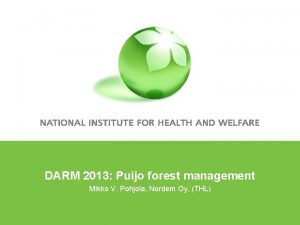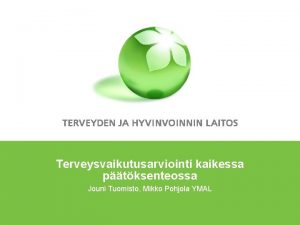Risk management A social learning perspective Mikko Pohjola










- Slides: 10

Risk management: A social learning perspective? Mikko Pohjola, THL

Contents • • Participation and openness Collective knowledge creation Science and shared belief systems Discussion • Role and possibilities of public in the swine flu case • Dimensions of openness –analysis: narcolepsy analysis • Sources of knowledge for public

Participation and openness • Manuscript: “Openness in participation, assessment, and policy-making upon issues of environment and health” • Literature review • Findings from two recent EU-projects • INTARESE (Integrated Assessment of Risks from Environmental Stressors in Europe) • BENERIS (benefit-risk assessment of food: An iterative value-of-information approach)

Participation and openness • Do common current conceptions of participation, assessment, and policy making provide the sufficient framework to achieve effective participation? • Effective: (desired) influences on the (societal) outcome • Policy making: decision making upon issues of societal importance • Assessments: systematic science-based endeavours of producing information to support policy making. • Participation: contributions from those who do not have formal roles as decision makers or experts in the assessment or policy processes in question.

Participation and openness • • • Participation techniques Purposes of participation Participation in assessment Participation in policy making Assessment-policy interaction

Participation and openness • Dimensions of openness • Implementation of openness • Comparison of approaches • Challenges of openness

Participation and openness 1. Main conclusions: 2. Inclusion of stakeholders and public to participate in assessments and policy making upon issues of environment and environmental health is an issue of both great interest and importance. 3. The discourses on both assessments and participation in the contexts of environment and environmental health have been too much focused on processes and procedures, and too little attention has been given to their purposes and outcome effectiveness in policy making. 4. Consideration of effective participation is meaningful only in the context of purposes and effects of the assessment and policy making processes that participation relates to. 5. The dimensions of openness framework provides a conceptual means for identifying and managing the interrelations between the purposes and outcomes of participation, assessment, and policy making, and thereby also for effective application of existing participatory models and techniques. 6. The dimensions of openness framework also provides a context for evaluation and constructive criticism of contemporary conventions and institutions of participation, assessment, and policy making, and a basis for developing new conventions and institutions. 7. From a contentual point of view, it can be argued that participation, assessment, and policy making upon environmental and environmental health issues should be considered as completely open rather than exclusive processes by default. 8. Openness should not, however, be considered as an end in itself, but rather a means for advancing societal development through creation and use of broadly distributed collective knowledge upon issues of great societal relevance. 9. Openness brings about challenges, but they are mostly practical, rather than fundamental in their nature.

Collective knowledge creation • Manuscript: “Pragmatic knowledge services” • Pragmatism • Innovation • Trialogical approach to knowledge creation and learning • Facilitation of collective knowledge creation considered in tomorrow’s lecture

Science and shared belief systems • Hypothesis development and testing • Abductive reasoning and argumentation • Game of questions and answers • Falsification and “scientific method” • • Justified true belief and its problems Inference rules Shared belief systems as artifacts (intentionally produced objects)

Discussion • Role and possibilities of public in the swine flu case • Dimensions of openness –analysis: THL’s narcolepsy analysis / related decision making • Sources of knowledge for public
